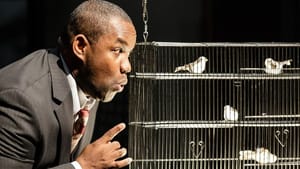Stay in the Loop
BSR publishes on a weekly schedule, with an email newsletter every Wednesday and Thursday morning. There’s no paywall, and subscribing is always free.
Ill-conceived hagiography
Opera Philadelphia's 'Yardbird' (third review)

When I was a teenager, I was more interested in jazz than classical music. My friends and I went to clubs to hear Dizzy Gillespie, Charlie Ventura, Lionel Hampton, Gene Krupa, Illinois Jacquet, Woody Herman, and Billy Eckstine. I interviewed most of them for my college radio station and found them to be thoughtful and intelligent, contrary to their widespread image as disreputable hop-heads. Yes, they smoked weed and talked openly about using heroin, but they had to be analytical, rational people to think up their intricate patterns of rhythm and pitch.
So I welcome this new opera, which humanizes bebop saxophonist Charlie Parker. Yardbird, however, leans too far toward lionizing him. Hagiography undermines the drama of a man who hurt family and friends even while he was an artistic virtuoso.
Let’s remember that Parker was not committed to a mental institution by racist enemies, but by his own friends, who feared for his life. And he was barred from Birdland, the jazz club named in his honor, because of his troublesome behavior. Many other musicians (Bunny Berigan, Bix Beiderbecke) were alcoholics, but Parker set a new standard for drunken, drugged-out, antisocial behavior.
A misleading portrayal
Yardbird shows a person misunderstood and oppressed, a caged man yearning to fly away to a better place. He sings about racial segregation: “I ain’t gonna sit in the back of the bus no more. . .back of the line, filling up jails, hanging from trees. No!” The opera tries to use Parker as a representation of racial oppression during that era. But it doesn’t ring true.
Parker had far more access to upper-crust society than other black people. He had a circle of multiracial supporters. He lived with white women, which was accepted within his orbit (although not by the management of the hotel where Parker died).
Parker’s persona in Wimberly’s libretto is a sturdy, well-dressed businessman, and Lawrence Brownlee’s stolid acting in the title role contributes to the image. There’s no indication that this man was severely physically impaired, with acute cirrhosis of the liver, by the time he was 34. No reflection of what one of his women sings: “You needed a shave. You looked like you slept in your clothes for days. . .like a big hairy ape had escaped from someplace scary.” What a wasted opportunity for drama!
The music lives
What lives on is Parker’s music. His improvisations made colorful use of “passing tones,” which are notes not included in normal harmonies, breaking the confines of simpler jazz soloing. He also displayed rapid sliding scales. Schnyder cleverly includes such devices in his score. The orchestral writing suggests where Parker might have been heading, blending bop with impressionistic writing.
The vocal score, on the other hand, is full-out opera. Brownlee and all of the cast sing with traditional operatic projection, declaiming their lines almost like Alban Berg’s 1925 opera, Wozzeck. The contrast is disconcerting; it distances the characters from the audience even as it separates them from Parker’s musical milieu. There’s not enough reminder of Parker’s music in the vocal writing.
Brownlee’s singing is florid, with Bird-like arpeggios. This is not surprising from a man who’s known for Rossini’s elaborate cabaletta, but Brownlee adds unexpected eloquence. Baritone Will Liverman contributes warm partnership as Dizzy Gillespie. Angela Brown sings dramatically as Parker’s strong mother. Rachel Sterrenberg, a Curtis grad, is tender in the solo where she asks Parker to let her light up his life. Chrystal E. Williams, who graduated from the Academy of Vocal Arts, is equally heartfelt as another one of Parker’s wives.
Angela Mortellaro is fine as a third Parker wife, while the excellent mezzo Tamara Mumford seems uncomfortable in the role of Parker’s patroness, the Baroness Pannonica de Koenigswarter, in whose hotel room Parker died in 1955. Corrado Rovaris draws expressive playing from the smallish orchestra, and he deserves credit for putting this enterprise together.
For Victor L. Schermer’s review, click here.
For Bruce Klauber’s review, click here.
What, When, Where
Charlie Parker’s Yardbird. Music by Daniel Schnyder. Text by Bridgette A. Wimberly. Ron Daniels directed. Corrado Rovaris, conductor. World premiere by Opera Philadelphia, through June 14, 2015 in the Perelman Theater at the Kimmel Center, Broad and Spruce Streets, Philadelphia. 215-732-8400 or www.operaphila.org.
Sign up for our newsletter
All of the week's new articles, all in one place. Sign up for the free weekly BSR newsletters, and don't miss a conversation.

 Steve Cohen
Steve Cohen